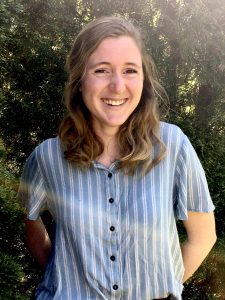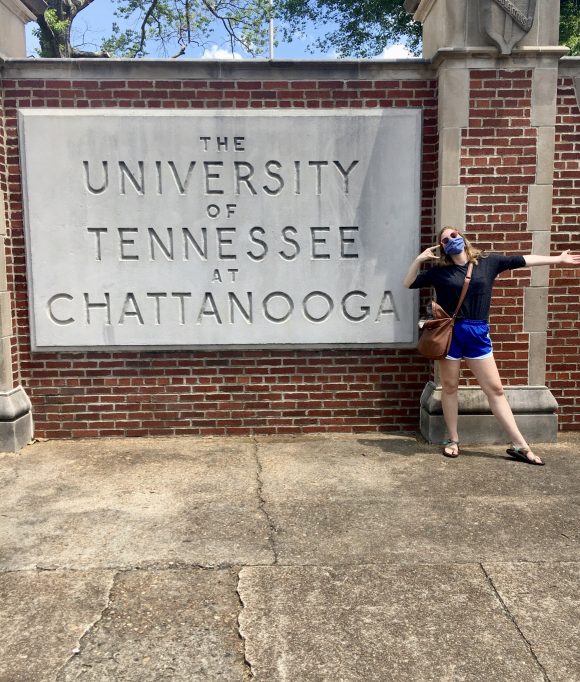***
2020 graduate Okland Scott on why she chose history, the value of a UTC history degree, and the courses and professors that prepared her for graduate school and beyond.
For the past four years, I have had the privilege of attending UTC and walking the path that has led to me becoming a historian. Through this walk I have had unique experiences, cultivated relationships, and taken history courses; all of which have equipped me as I begin the next chapter of my life post-graduation.
I entered UTC with one certainty; that I was enamored by the subject of history. As I was tasked with picking a major I thought to myself, “History teacher, right?” I thought the only way to stay connected with history throughout my education and career was to become either a lawyer or a teacher. And so I entered my freshman year as a secondary education major with a focus on social studies.

My journey as a historian truly began during the spring semester of my sophomore year in an intro class, United States History from 1865 to present, taught by Dr. Erskine. Part of the class curriculum was an experiential learning project where our class was tasked with conducting an oral history interview. As I went through the process of learning how to conduct the interview and taking my first trip to the Special Collections to check out a recording device, I realized that there were historical careers that I had yet to learn about.
Following my oral history project, I took what I felt was a leap of faith and changed my major to history. The semester that followed this transition was tough. I was determined to invest myself entirely in the major. This included enrolling in three history classes which stretched and pulled at my mind. I was assigned countless writing assignments and given more primary and secondary readings each week than I thought was possible. I soon realized, through class discussions, that I was not picking up on the same key points as my peers and professors through the analysis of primary sources. I was discouraged by this learning curve, and began to doubt my capabilities. Despite the hovering doubts, I persevered into the next semester, knowing that consistent hard work was the only way to succeed. This persistence paid off as I found myself more engaged and confident in my abilities as each semester went by.
While a history major I wanted to involve myself as much as I could. I discovered that the more I involved myself with what the department had to offer, the more engaged I was in my studies. There was a semester where I said “yes” to everything. Within the span of a couple of weeks I became a peer mentor to a freshman First Year Experience class, signed up to be a Supplemental Instructor for History 2010, and volunteered to be the Vice President of the History Club. It was a lot of newness at once, and was frankly a little daunting. But I soon found myself making friends through classes and frequently dropping by the department office to chat with the department administrator, Shelly Dell. The more I said yes to what UTC and the history department had to offer, the more I felt a part of a community.
These experiences and relationships prepared me for the next step in my walk through college as a historian: an internship. By working with Dr. Thompson, I was able to secure an internship with the Special Collections in the UTC library. This internship, an echo of my oral history project, ended up being one of the most impactful experiences I had during my time at UTC. I worked alongside the Special Collections Director, Carolyn Runyon, during my internship to create metadata and catalog the Willy King papers into the program ArchivesSpace. I had the chance to put the skills that I had gathered in my history classes to practical use while also gaining a new perspective on the importance of the organization of information. For years I had used and consumed primary sources to provide evidence for papers, but I had never considered the process that it took to make those sources accessible. This new world intrigued me and prompted me to consider what archiving would look like as a career. Following my internship I was offered a student assistant position in the Special Collections, and was able to continue my work with the Willy King papers.
One of the relationships I strived to cultivate was with my faculty advisor, Dr. Eckelmann Berghel. I made conscious efforts to have intentional meetings with her, asking questions and taking her advice seriously. When I made the choice to begin to apply to graduate programs in the fall semester of my senior year, Dr. Eckelmann Berghel regularly met with me to read over my application drafts and offer suggestions. Week after week she would read and review my work, encouraging me in my choices, and reassuring me that everyone in the history department would do what it took to help me achieve my educational goals. It was with her help that I was able to send off applications to three universities, all of which I received acceptance letters to. I am proud to announce that I will be attending the University of Tennessee in August 2020 for Information Science, with the hopes of becoming an archivist.

All of the intentional actions and hard work through classes came to a head in my capstone senior seminar, also known as the “crown jewel” of history classes. This class was a chance for me to put all of the writing, reading, and communication skills to the ultimate test amid the peers that I had gotten to know over the past years. The course, taught by Dr. Thompson, covered the topic of American slavery in Chattanooga and its legacies today. As a class we were able to ask important questions, have direct conversations, and work our way through the heavy content. And while I was challenged, I also felt that I had all of the tools necessary to succeed in the class. Along with these academic tools, I employed an additional priceless skill that I had acquired through my studies: self-confidence. My professors had shown me the value of varying view points and opinions throughout history. They also actively demonstrated to us how to respect another’s word by listening to students and respecting them wherever they were coming from. This demonstration showed me that my mind could produce unique thoughts and ideas, and empowered me to share my own during class time. When it came time for me to have the lengthy discussions which are the core of the capstone, I felt more than ready.
As a freshly graduated UTC student I find myself already reaping the benefits of my time studying in the history department. As this country works through a global pandemic alongside the tension of racial injustices, I have been able to use the history I have learned to provide historical context and walk with my family and friends through tough conversations. I have also used my knowledge of analysis and “reading against the grain” while parsing through the never-ending flow of information on current events. I feel equipped to listen and equipped to learn.
As I turn the page to the next chapter of my life, I feel more than ready to tackle whatever comes at me. But no matter where I end up, I will always be a UTC history major at heart and am thankful for my time spent there.